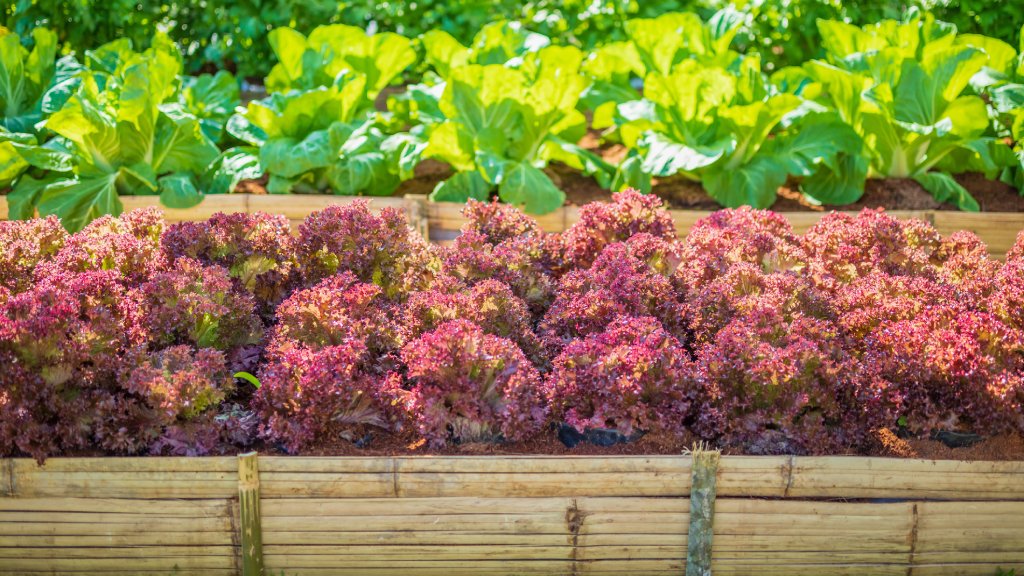
Sign up for the Gardening Know How newsletter today and receive a free copy of our e-book "How to Grow Delicious Tomatoes".
You are now subscribed
Your newsletter sign-up was successful
Growing lettuce in the garden is easy and rewarding, and growing red lettuce is much more interesting. Not only does red lettuce add a splash of color to salads and wraps, but it matures more quickly and is higher in nutrition than its green counterpart. Sure, you can grow iceberg or green leaf lettuce, but sometimes it’s nice to shake things up with some color. There are many different lettuce types to choose from, but we’re going to focus on 5 of them. So go wild, and read on to learn about growing the different red lettuce types.
Is Red Leaf Lettuce Healthier?
Both green and red lettuce are nutrient-rich (and low-calorie). Red lettuce gets its color from the pigment anthocyanin, which is said to have anti-carcinogenic and anti-inflammatory properties. Some studies suggest that anthocyanin may also help with cardiovascular disease, obesity, and diabetes.
With the exception of anthocyanin, however, green lettuce actually trumps red as far as nutrition value. It is higher in vitamins A and K, fiber and micronutrients than red lettuce. That said, both are an excellent choice to add to a healthy diet.
Tastiest Types of Red Lettuce
The best tasting lettuce is really an individual choice. I prefer cos or romaine lettuce because I like their sturdiness and crunch. By the way, there is a red romaine lettuce.
Both green and red leaf lettuces have similar flavors; mildly sweet with a hint of nuttiness. Red leaf lettuce is delicate and ruffled, quite pretty actually, but with little of the crispness or crunch of romaine or iceberg. It has a bitter/sweet aroma that morphs into a mildly bitter flavor in mature leaves. Its shelf life is also significantly shorter than green leaf varieties.
Prettiest Red Lettuce Types
Just as beauty is in the eye of the beholder, choosing the prettiest red lettuce type is an individual choice. The various red hues alone are a sight to behold. Combine that with delicate, usually ruffled leaves and all of them are beautiful.
- Red Sails is probably the most common red leaf lettuce. Developed in 1985, it resists bolting, is cold tolerant, stays flavorful and not bitter, and forms large frilly heads.
- Red Deer Tongue not only has a fabulous name but is an heirloom variety that forms loose heads with long leaves. It is quick to bolt, so grow it in the spring or fall only.
- Ruby Gem forms pretty rosettes with green centers. Growing to about 10 inches (25 cm) across, this variety of red leaf lettuce works well in containers and window boxes. It is also bolt-resistant, thriving through the heat of summer.
- Merlot is said to be the darkest of the red lettuces. It has crisp, wavy leaves, is bolt-resistant and has excellent cold tolerance. This one is perfect for late fall to winter crops that can be cut or harvested as cut-and-come again.
- Galactic is a burgundy-colored red leaf with glossy, broad leaves with a touch of green at the base. This is an open-pollinated variety that is often used for baby leaf production. It is resistant to downy mildew.
Frequently Asked Questions
Does Red Leaf Lettuce Taste Different Than Green?
Both have a similar flavor; semi-sweet with some nuttiness. Red leaf tends to become more bitter as the leaves mature and has been described as slightly sweet and bitter with notes of hazelnut.
Is Red Leaf Lettuce a Perennial?
No. Red leaf lettuce is a cool weather annual that thrives when temperatures are between 60-70 F (16-21 C). Some varieties, however, can be harvested on a cut-and-come basis, or a second crop can be planted in the fall to extend the harvest.
Sign up for the Gardening Know How newsletter today and receive a free copy of our e-book "How to Grow Delicious Tomatoes".

Amy Grant has been gardening for 30 years and writing for 15. A professional chef and caterer, Amy's area of expertise is culinary gardening.
